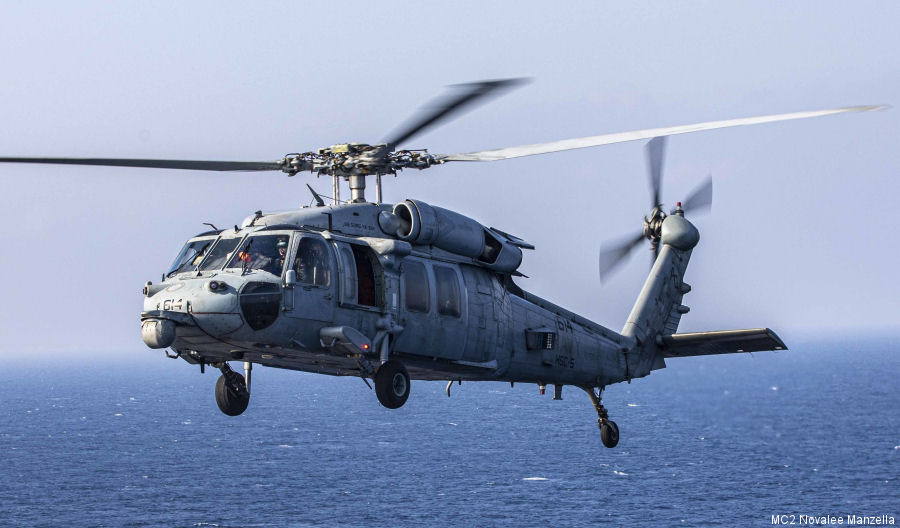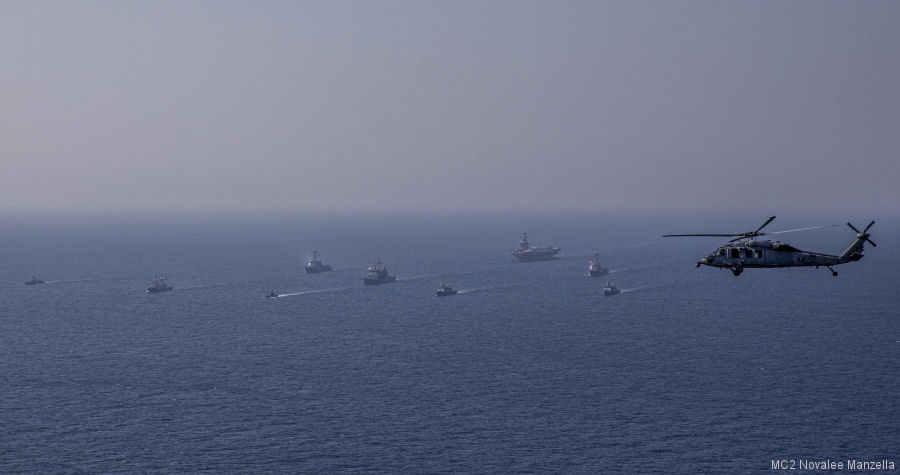
US Navy, January 26, 2023 - ADRIATIC SEA by PO2 Richard Rodgers – Helicopter Sea Combat Squadron (HSC) 5 completed inland training using an Albanian range in Bizë, Albania, Jan. 15-17, 2023.
The training varied from mountain flying - a challenging and dangerous proposition for helicopters due to the thin air and high engine power requirements - to low-level tactical flying, off-airport landing, and multi-unit coordinated exercises featuring rotary-wing and fixed-wing squadrons.
The primary mission for HSC 5 is search-and-rescue for fixed-wing flight operations.
Anytime fixed-wing aircraft are launching from, flying near, or landing on the Nimitz-class aircraft carrier USS George H.W. Bush (CVN 77), HSC 5 is airborne near the ship. However, due to the unique location of the ship’s scheduled deployment to the U.S. Sixth Fleet area of operations, and the generous cooperation from NATO Allies, HSC 5 had the rare opportunity to train in Albania.
“The Bizë range is ideally suited for overland training, and the user-friendly airspace allows robust air wing integration,” said Cmdr. Erik Gustafson, commanding officer of HSC 5. “The mountainous approach and wide open training area allows our team practice in multiple competencies in a single visit. We greatly appreciate the cooperation of the Albanian land forces who enabled us to execute exquisite training in close proximity to the Adriatic operating area.”
Cooperation between the U.S. Navy and Albania allowed units from both nations to train and build capability in an environment unlike those they are accustomed to, contributing to unit readiness and increased interoperability and interchangeability in the NATO alliance.
“The geography of Bizë poses unique challenges designed to strengthen and improve the skillset of units training within it and we’re happy to work with Albania to exercise tactical air capabilities,” said Lt. Cmdr. Steve Berres, a pilot from HSC 5. “Opportunities to train and expand our capabilities are key to the success of our individual units and our integration within NATO.”
George H.W. Bush is the flagship of CSG 10, George H.W. Bush CSG. CSG 10 is comprised of George H.W. Bush, Carrier Air Wing (CVW) 7, Destroyer Squadron (DESRON) 26, the Information Warfare Commander, and the Ticonderoga-class guided-missile cruiser USS Leyte Gulf (CG 55).
The ships of DESRON 26 within CSG 10 are the Arleigh Burke-class guided-missile destroyers USS Nitze (DDG 94), USS Farragut (DDG 99), USS Truxtun (DDG 103), and USS Delbert D. Black (DDG 119).
The squadrons of CVW 7 embarked aboard the George H.W. Bush are the “Sidewinders” of Strike Fighter Squadron (VFA) 86, the “Jolly Rogers” of VFA-103, the “Knighthawks” of VFA 136, the “Pukin Dogs” of VFA 143, the “Bluetails” of Carrier Airborne Early Warning Squadron (VAW) 121, the “Patriots” of Electronic Attack Squadron (VAQ) 140, the “Nightdippers” of HSC 5, and the “Grandmasters” of Helicopter Maritime Strike Squadron (HSM) 46.
For over 80 years, NAVEUR-NAVAF has forged strategic relationships with allies and partners, leveraging a foundation of shared values to preserve security and stability.
Headquartered in Naples, Italy, NAVEUR-NAVAF operates U.S. naval forces in the U.S. European Command (USEUCOM) and U.S. Africa Command (USAFRICOM) areas of responsibility. U.S. Sixth Fleet is permanently assigned to NAVEUR-NAVAF, and employs maritime forces through the full spectrum of joint and naval operations.
The George H.W. Bush CSG is on a scheduled deployment in the U.S. Naval Forces Europe area of operations, employed by U.S. Sixth Fleet to defend U.S., allied, and partner interests.
The training varied from mountain flying - a challenging and dangerous proposition for helicopters due to the thin air and high engine power requirements - to low-level tactical flying, off-airport landing, and multi-unit coordinated exercises featuring rotary-wing and fixed-wing squadrons.
The primary mission for HSC 5 is search-and-rescue for fixed-wing flight operations.
Anytime fixed-wing aircraft are launching from, flying near, or landing on the Nimitz-class aircraft carrier USS George H.W. Bush (CVN 77), HSC 5 is airborne near the ship. However, due to the unique location of the ship’s scheduled deployment to the U.S. Sixth Fleet area of operations, and the generous cooperation from NATO Allies, HSC 5 had the rare opportunity to train in Albania.
“The Bizë range is ideally suited for overland training, and the user-friendly airspace allows robust air wing integration,” said Cmdr. Erik Gustafson, commanding officer of HSC 5. “The mountainous approach and wide open training area allows our team practice in multiple competencies in a single visit. We greatly appreciate the cooperation of the Albanian land forces who enabled us to execute exquisite training in close proximity to the Adriatic operating area.”
Cooperation between the U.S. Navy and Albania allowed units from both nations to train and build capability in an environment unlike those they are accustomed to, contributing to unit readiness and increased interoperability and interchangeability in the NATO alliance.
“The geography of Bizë poses unique challenges designed to strengthen and improve the skillset of units training within it and we’re happy to work with Albania to exercise tactical air capabilities,” said Lt. Cmdr. Steve Berres, a pilot from HSC 5. “Opportunities to train and expand our capabilities are key to the success of our individual units and our integration within NATO.”
George H.W. Bush is the flagship of CSG 10, George H.W. Bush CSG. CSG 10 is comprised of George H.W. Bush, Carrier Air Wing (CVW) 7, Destroyer Squadron (DESRON) 26, the Information Warfare Commander, and the Ticonderoga-class guided-missile cruiser USS Leyte Gulf (CG 55).
The ships of DESRON 26 within CSG 10 are the Arleigh Burke-class guided-missile destroyers USS Nitze (DDG 94), USS Farragut (DDG 99), USS Truxtun (DDG 103), and USS Delbert D. Black (DDG 119).
The squadrons of CVW 7 embarked aboard the George H.W. Bush are the “Sidewinders” of Strike Fighter Squadron (VFA) 86, the “Jolly Rogers” of VFA-103, the “Knighthawks” of VFA 136, the “Pukin Dogs” of VFA 143, the “Bluetails” of Carrier Airborne Early Warning Squadron (VAW) 121, the “Patriots” of Electronic Attack Squadron (VAQ) 140, the “Nightdippers” of HSC 5, and the “Grandmasters” of Helicopter Maritime Strike Squadron (HSM) 46.
For over 80 years, NAVEUR-NAVAF has forged strategic relationships with allies and partners, leveraging a foundation of shared values to preserve security and stability.
Headquartered in Naples, Italy, NAVEUR-NAVAF operates U.S. naval forces in the U.S. European Command (USEUCOM) and U.S. Africa Command (USAFRICOM) areas of responsibility. U.S. Sixth Fleet is permanently assigned to NAVEUR-NAVAF, and employs maritime forces through the full spectrum of joint and naval operations.
The George H.W. Bush CSG is on a scheduled deployment in the U.S. Naval Forces Europe area of operations, employed by U.S. Sixth Fleet to defend U.S., allied, and partner interests.

Carrier Strike Group 10
See also |
HSC-5
Seahawk in




